January 8, Father Bill Cullen, Retired
January 12, Father José Lopez, Retired
Thank you for answering the call!
January 8, Father Bill Cullen, Retired
January 12, Father José Lopez, Retired
Thank you for answering the call!
By OSV News
Archbishop Gregory M. Aymond of New Orleans offered prayers for victims of what he described as a “sign of utter disrespect for human life” perpetrated by a man who drove a Ford pickup truck through crowds celebrating the New Year in New Orleans’ French Quarter around 3:15 a.m. Jan. 1. At least 15 people were reportedly killed, with around 35 others injured.
The driver was killed by police after leaving the vehicle and exchanging gunfire with law enforcement, striking two officers. The FBI is investigating the attack as an act of terrorism.
“Our prayers go out to those killed and injured in this morning’s horrific attack on Bourbon Street,” said Archbishop Aymond, a New Orleans native, in a Jan. 1 statement. “This violent act is a sign of utter disrespect for human life. I join with others in the Roman Catholic Archdiocese of New Orleans in offering prayerful support to the victims’ families. I give thanks for the heroic duty of hundreds of law enforcement and medical personnel in the face of such evil.”
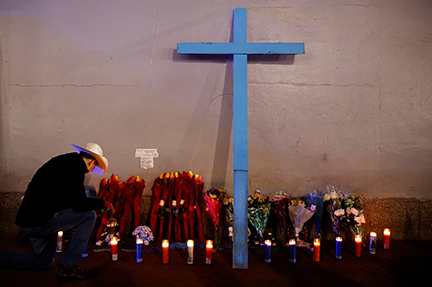
Officials identified the driver as Shamsud-Din Jabbar, and said he likely did not act alone. An ISIS flag was located on the vehicle’s trailer hitch. The FBI found explosive devices in the pickup truck and elsewhere in the French Quarter, including reportedly near the historic Cathedral Basilica of St. Louis.
In an early afternoon press conference, officials described Jabbar, 42, as “a U.S.-born citizen from Texas” and U.S. Army veteran, and that law enforcement is looking for known associates. Anyone who had interacted with Jabbar within 72 hours prior to the attack is asked to contact the FBI at the agency’s tip line, 1-800-CALL-FBI.
New Orleans Police Superintendent Anne Kirkpatrick and other city officials confirmed that the attack was deliberate and that they were focused on ensuring the safety of the city’s residents and visitors. Officials did not release information about the identities of the victims known dead. A few hours later, authorities updated the death count from 10 to 15.
Louisiana Attorney General Liz Murrill said during the press conference that there were “some people who are fighting for their lives right now in the hospital.”
“So I’d ask everyone to pray for them,” she said. “They need our support and they need our prayers.
“This was a heinous act. A heinous, cowardly act,” she added. “And we will find them and we will bring them to justice.”
At the press conference, Louisiana Gov. Jeff Landry announced he had issued an amended emergency declaration so “that we could bring all of our federal, state, and local agencies to bear in preparation for the Super Bowl and Mardi Gras.” Because of the attack, Landry said he also ordered “the mobilization of a military police company” in New Orleans.
Also speaking at the press conference, U.S. Sen. John Kennedy said, “I wish I understood better why bad things happen to good people.”
“If I make it to heaven, I’m going to ask,” he said. “For those people who don’t believe in objective evil, all you have to do is look at what happened in our city early this morning. If this doesn’t trigger the gag reflex of every American, every fair-minded American, I’ll be very surprised.”
Kirkpatrick, whose role includes chief of police, called the action “evil” and that “New Orleans Police and all law enforcement is built, we are built, for dealing with evil.”
President Joe Biden said in a statement that he was “grateful for the brave and swift response of local law enforcement in preventing even greater death and injury.”
“I have directed my team to ensure every resource is available as federal, state, and local law enforcement work assiduously to get to the bottom of what happened as quickly as possible and to ensure that there is no remaining threat of any kind,” he said.
University of Notre Dame president Father Robert Dowd, a priest of the Congregation of Holy Cross, shared a message on a website for Notre Dame alumni and friends and on X, where he said the university community extends “our deepest gratitude to the brave first responders who risked their lives to protect others.”
“To be in solidarity with those who suffer is to exemplify the spirit of Notre Dame,” he wrote. “Today, we are in solidarity with all those impacted by this tragedy.”
Saying that it is “always grounded in faith, hope, and love, especially at difficult times,” the Cathedral Basilica of St. Louis posted on social media the archdiocese’s “Family Prayer” requesting the intercession of Mary under the title of “Our Lady of Prompt Succor.” It noted that the church “serves the entire Archdiocese and far beyond, but the French Quarter is our home and neighborhood.”
“We stand in solidarity with those who lost loved ones this morning,” it said. “We are grateful for the first responders and other healthcare and law enforcement professionals who put themselves in harm’s way and who care for the injured.”
The attack occurred on the solemnity of Mary, Mother of God, and the World Day of Peace.
By Justin McLellan
VATICAN CITY (CNS) – In a troubled world, the birth of Christ reveals God’s unwavering determination to draw all people to himself and illuminate even the darkest corners, Pope Francis said.
Despite being born into a world “where there is a great need for light, for hope and a need for peace, a world where people at times create situations so complicated that it seems impossible to get out of them,” Jesus, the pope said, opens windows of light “even in the darkest nights of humanity.”
“God never stops, he finds a thousand ways to reach everyone, each and every one of us, wherever we are, without calculation and without conditions,” he said before praying the Angelus with visitors in St. Peter’s Square Jan 5.
Pope Francis said that Christmas celebrates how Jesus, through his humble birth, “overcomes so many walls and so many divisions.”
“He confronts the closed minds and hearts of the ‘great’ of his time, who are concerned more with defending power than seeking the Lord,” he said.
Born to parents “without means,” Jesus offers himself to the shepherds who were in the fields with their sheep, “men whose hearts are marked by the harshness of life and the disdain of society,” the pope said, as well as to the Magi who find Jesus “in great poverty.”
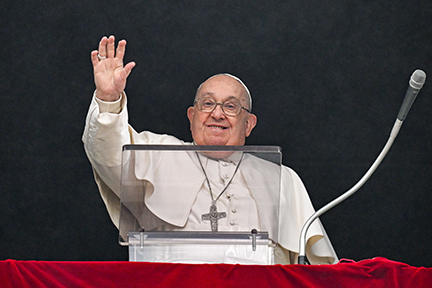
Pope Francis said Christians should be consoled and encouraged by the context of Jesus’ birth: “It seems impossible to get out of so many situations, but today the word of God tells us that it is not.”
He said that Christians are called to “to imitate the God of love, opening up glimmers of light wherever we can, with whomever we meet, in any context: family, social, international.”
God “invites us to not be afraid of taking the first step,” the pope said. “This is the Lord’s invitation today: let us not fear taking the first step; it takes courage to do it but let us not be afraid.”
Pope Francis said that opening “wide bright windows of closeness to those who are suffering, of forgiveness, of compassion and reconciliation” are the “many first steps we must take to make the path clearer, safer and possible for all.”
Particularly during the current Holy Year, he said, God invites Christians to be messengers of hope by saying “yes” to life in simple and concrete ways “with choices that bring life.”
After praying the Angelus, Pope Francis prayed for peace in Ukraine, Palestine, Israel, Lebanon, Syria, Myanmar and Sudan. He called on the international community to “act firmly so that humanitarian law is respected in conflicts.”
“No more striking schools, hospitals; no more hitting workplaces,” he said. “Let us not forget that war is always a defeat, always!”
IN EXILE
By Father Ron Rolheiser, OMI
We crave few things as deeply as self-expression and recognition. We have an irrepressible need to express ourselves, be known, recognized, understood and seen by others as unique, gifted and significant. A heart that is unknown, unappreciated in its depth, lacking in meaningful self-expression and recognition, is prone to restlessness, frustration and bitterness. And, truth be told, self-expression is difficult and full self-expression is impossible.

In the end, for most of us, our lives are always smaller than our needs and our dreams, no matter where we live or what we accomplish. In our daydreams each of us would like to be famous, the renowned writer, the graceful ballerina, the admired athlete, the movie star, the cover girl, the renowned scholar, the Nobel Prize winner, the household name; but in the end, most of us remain just another unknown, living among other unknowns, collecting an occasional autograph.
And so, our lives can seem too small for us. We feel ourselves as extraordinary, forever trapped inside the mundane, even as there is something inside us that still seeks expression, that still seeks recognition, and that feels that something precious inside us is living and dying in futility. In truth, seen only from the perspective of this world, much of what is precious, unique and rich, seemingly is living and dying in futility. Only a rare few achieve satisfying self-expression and recognition.
There’s a certain martyrdom in this. Iris Murdoch once said: “Art has its martyrs, not the least of which are those who have preserved their silence.” Lack of self-expression, whether chosen or imposed by circumstances, is a real death; but like all deaths it can be understood and appropriated in very different ways.
If it is accepted unhappily as tragic, it leads to bitterness and a broken spirit. If, however, it is understood and appropriated in faith as an invitation to be a hidden cell inside the Body of Christ and the human family, to anonymously provide sustenance and health to the overall body, it can lead to restfulness, gratitude and sense of significance that lays the axe to the roots of our frustration, disappointment, depression and bitterness.
I say this because much of what gives us life and sustains us in our lives has not been provided by the rich and famous, the high achievers and those to whom history gives credit. As George Eliot points out, we don’t need to do great things that leave a big mark in human history because “the growing good of the world is partly dependent on unhistoric acts; and that things are not so ill with you and me as they might have been is half owing to the number who lived faithfully a hidden life and rest in unvisited tombs.”
Well said. History bears this out. I think, for instance, of Therese of Lisieux who lived out her life in obscurity in a little convent tucked away in rural France, who when she died at age 24, was probably known by fewer than 100 people. In terms of how we assess things in this world she accomplished very little, nothing in terms of outstanding achievement or visible contribution. She entered the convent at age fifteen and spent the years until her early death doing menial things in the laundry, kitchen and garden inside her obscure convent. The only tangible possession she left behind was a diary, a personal journal with bad spelling, which told the story of her family, her upbringing and what she experienced during her last months in palliative care as she faced death.
But what she did leave behind is something that has made her a figure who is now renowned around the world, both inside and outside of faith circles. Her little private journal, The Story of a Soul, has touched millions of lives, despite its bad spelling (which had to be corrected by her sisters after her death).
What gives her little journal its unique power to touch hearts is that it chronicles what was happening inside the privacy of her own soul during all those years when she was hidden away and unknown, as child and as a nun. What she records in the story of her soul is that she, fully aware of her own uniqueness and preciousness, could unbegrudgingly give that all over in faith because she trusted that her gifts and talents were working silently (and powerfully) inside a mystical (though real, organic) body, the Body of Christ and of humanity. She understood herself as a cell inside a living body, giving over what was precious and unique inside her for the good of the world.
Anonymity offers us this invitation. There is no greater work of art that one can give to the world.
Jesus said as much. He told us to do our good deeds in secret and not let our left hand (and our neighbors and the world) know what our right hand is doing.
(Oblate Father Ron Rolheiser is a theologian, teacher and award-winning author. He can be contacted through his website www.ronrolheiser.com.)
By Richard Szczepanowski
WASHINGTON (OSV News) – Hours after Cardinal Robert W. McElroy of San Diego was announced Jan. 6 as the new archbishop of Washington, the prelate praised his new archdiocese as “truly sacramental in the rich diversity of its traditions and perspectives.”
He also pledged to “show reverence for the grace of God which is already present in your midst and in the commitment to discipleship that underlies this local church.”
“I come as your bishop seeking to know and understand this magnificent community of faith,” Cardinal McElroy said. “As your pastor, an essential element of my mission is to encounter the hearts and the souls of the disciples who form our local church.”
In a virtual news conference at the Cathedral of St. Matthew the Apostle in Washington, Cardinal McElroy addressed his new flock via the Archdiocese of Washington’s YouTube channel because a major snowstorm shut down the city.
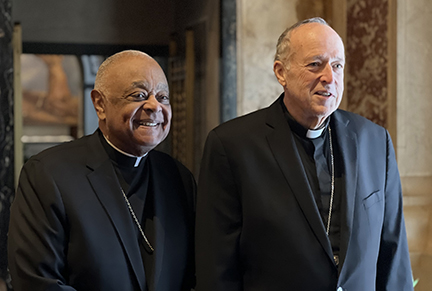
“I want to give thanks to God for the grace-filled life of this local church and to Our Holy Father, Pope Francis who today makes me a member of that church,” Cardinal McElroy said.
Early Jan. 6, Pope Francis accepted the resignation of Cardinal Wilton D. Gregory, Washington’s archbishop since 2019, and named the San Diego prelate as his successor. As required by church law, Cardinal Gregory had submitted his resignation to the pope when he turned 75, which was two years ago, on Dec. 7, 2022.
The new archbishop of Washington said he has embraced Pope Francis’ emphasis on synodality and its call for the faithful to “build up a church centered in the Eucharist and devoted to the Word of God and the sacraments which sustain us.”
“Synodality calls us to walk humbly as a church, acknowledging our faults and sinfulness, and seeking forgiveness,” said Cardinal McElroy, who is 70. “It seeks the participation of every disciple in the church’s journey in this earthly pilgrimage, and is oriented toward the building of unity in society rooted in God’s justice, which cares especially for the unborn, the poor, the marginalized and the dispossessed.”
He said that in the Archdiocese of Washington, “for the past 85 years, the Catholic community has radiated the light of Christ throughout the District of Columbia and the surrounding five counties in Maryland.”
The archdiocese is home to more than 671,000 Catholics in D.C. and Maryland’s Montgomery, Prince George’s, St. Mary’s, Calvert and Charles counties.
Cardinal McElroy praised the archdiocese for its “rich parish communities of faith” and its “path-breaking development of lay ministries and apostolates, and the nurturing in lay leadership in the church that is genuinely participative and inclusive.”
The people of his new archdiocese, the cardinal said, are “men and women who form the people of God, struggling in a world filled with turbulence, hardship and illusion, to follow the pathway of Jesus Christ … (and are) called to be both dispensers and receivers of mercy and forgiveness.”
He noted that the Archdiocese of Washington has experienced “mountain-top moments” such as the visits of St. John Paul II, Pope Benedict XVI and Pope Francis and has endured “moments of failure and shame,” including reports of the sexual abuse of minors.
“In this mixture of the mountain top and failure, we are no different from the first disciples of the Lord,” Cardinal McElroy said. “It is to this community on the journey of faith that the Holy Father has called me to be bishop and pastor.”
Cardinal McElroy said Cardinal Gregory – appointed by Pope Francis in 2019 as the seventh archbishop of Washington and elevated to the College of Cardinals the following year – displayed “courage, a deeply pastoral heart and abiding faith in God and the dignity of the human person” as he “made critically important contributions at crucial moments in order to bring the Gospel of Jesus to the heart and the soul of the Catholic community here in Washington.”
At the Jan. 6 conference, Cardinal Gregory said, “As I reflect upon the past nearly six years in this wonderful local church of Washington, my heart is filled predominantly with joy and gratitude for the many blessings, always appreciated but rarely deserved that God has granted me.”
He thanked the priests, auxiliary bishops and the faithful, noting that “we have loved one another, cared for one another, challenged one another to be the Catholic Church Jesus Christ calls us to be.”
Cardinal Gregory said that he plans to remain in Washington after his retirement and serve where needed.
(Richard Szczepanowski is managing editor of the Catholic Standard, newspaper of the Archdiocese of Washington.)
BILOXI – Father John J. Kelly, 88, of Biloxi, peacefully passed away on Dec. 29, 2024, following a brief illness. A devoted servant of the Catholic Church, Father Kelly dedicated his life to faith, family and fostering connections between his beloved Ireland and the United States.
Born on June 23, 1936, at Falnashamer House in Ballintogher, County Sligo, Ireland, Father Kelly faced an early tragedy with the passing of his parents when he was just seven months old. He and his six siblings were lovingly raised by their aunt, Eleanor Jane Meehan.
Father Kelly pursued his vocation at Summerhill College in Sligo, and St. Patrick’s College Carlow, Ireland culminating in his ordination on June 6, 1964, at Carlow Cathedral. Soon after, he traveled to the Diocese of Natchez-Jackson, where he ministered in parishes across Biloxi, Laurel, Bay Saint Louis, Indianola, Gulfport, Lakeshore and Clermont Harbor. Throughout his long career, he profoundly enriched the spiritual lives of his parishioners.
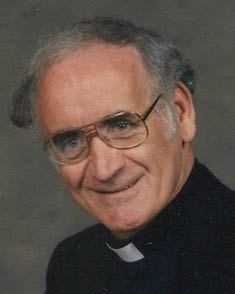
Father Kelly’s faith was equaled only by his deep love for family. He is survived by his sisters, Tilda Mahon, Phyllis McGrory and Doreen Murray. His legacy of love and devotion lives on through his numerous cousins, nieces, nephews, grandnieces and grandnephews. Always present in their lives, Father Kelly celebrated countless family milestones, including baptisms, communions, confirmations, weddings and funerals.
A man of two worlds, Father Kelly cherished his Irish roots and American home. He frequently visited Ireland, spending many holidays, reconnecting with family and friends.
He was preceded in death by his parents, Timothy Kelly and Mary Elizabeth Kelly (nee Meehan); his aunt, Eleanor Jane Meehan; his brothers, Christopher (Chris) and Timothy Alphonsus (Alfie); and his sister, Rosemary.
A Mass of Christian Burial was held on Saturday, Jan. 4, 2025, at the Cathedral of the Nativity of the Blessed Virgin Mary, Biloxi, with burial at the Old Biloxi Cemetery. There will be a separate service in Ireland for family and loved ones at a future date.
Expressions of sympathy may be made to Our Lady of Fatima Catholic Church, Priest Retirement Fund, 2090 Pass Road, Biloxi, MS 39531, or the Society of St. Vincent de Paul, Sligo, Ireland.
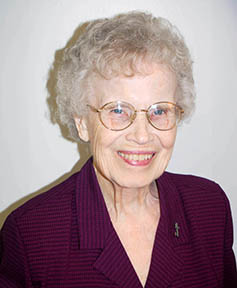
LOUISVILLE, Kentucky – Ursuline Sister of Louisville Antonine Biven, O.S.U. age 96, died in the 77th year of her religious life on Dec. 28, 2024, at Nazareth Home–Clifton in Louisville. A native of Louisville, Kentucky, Mildred Louise (her baptismal name) graduated from the former Ursuline Academy. She entered the Ursulines in 1947 at age 19.
A gifted musician, her high school classmates pooled their money together her senior year to rent Memorial Auditorium so that she could give a piano concert. On the ride home on a city bus, someone noticed her sheet music and asked, “Do you play?” Mildred Louise answered, “A little.” As a postulant, she learned to play everything from a violin to a saxophone, and while practicing the trombone, knocked her bonnet off her head with her slide!
Sister Antonine was a music teacher at St. Raphael, St. Therese, Our Lady of Lourdes, St. Helen, St. Francis of Assisi and Sacred Heart Model School in Louisville, as well as St. Mary School in Jackson, Mississippi, and Ursuline High School in Columbia, South Carolina.
Sister also served as pastoral associate and music minister at St. Mary Church in Maryville, Kentucky, pastoral associate of music at St. Helen Church and director of music at Our Lady of Lourdes Church, both in Louisville. She was honored by Our Lady of Lourdes for her years of service in 2023.
Sister Antonine earned a bachelor of arts degree from the former Ursuline College (now Bellarmine University) in Louisville, a master of arts degree in music from Notre Dame University and a master’s degree in religious education from Loyola University New Orleans.
She served on the Ursuline Sisters’ leadership team three times between 1976 and 1992. Sister Antonine also ministered at Project Women (now Family Scholar House) and the former Marian Home on the Ursuline Campus.
Sister Antonine is the daughter of the late Frederick and Lillian Kleier Biven. She is survived by several nieces and nephews, great-nieces and nephews, great-grand nieces and nephews, as well as her community of Ursuline Sisters and Associates.
Expressions of sympathy may be made to the Ursuline Sisters of Louisville and mailed to the Donor Relations Office, 3115 Lexington Road, Louisville, KY 40206.
The Catechism of the Catholic Church instructs, “The more prosperous nations are obliged, to the extent they are able, to welcome the foreigner in search of the security and the means of livelihood which he cannot find in his country of origin.”
At the same time, the church has also made clear human laws are also subject to divine limits. St. John Paul II’s 1993 encyclical “Veritatis Splendor” (“Splendor of Truth”) and 1995 encyclical “Evangelium Vitae” (“The Gospel of Life”) both quote the Second Vatican Council’s teaching in “Gaudium et Spes,” the Pastoral Constitution on the Church in the Modern World, which names “deportation” among various specific acts “offensive to human dignity” that “are a disgrace, and so long as they infect human civilization they contaminate those who inflict them more than those who suffer injustice, and they are a negation of the honor due to the Creator.”
The late pontiff underscored their moral severity in “Veritatis Splendor” by calling them examples of “intrinsic evil,” explaining that, no matter the motives, these acts are “not capable of being ordered to God and to the good of the person.”
By Kimberley Heatherington
(OSV News) – Since President-elect Donald Trump’s Nov. 5 victory, most Americans expect him to tackle the issue of immigration within the first 100 days of reoccupying the Oval Office.
But will immigrants who registered with the federal government – hoping for a path to citizenship through programs such as Keeping Families Together (KFT), Consideration of Deferred Action for Childhood Arrivals (DACA), and Temporary Protected Status (TPS) – actually be the most vulnerable to deportation?
The answer may hinge both on whether the information provided to the Department of Homeland Security will be used for deportation purposes – and how quickly the Trump administration wants to deliver results on its mass deportation pledge.
When it comes to migrants’ information with DHS, in the past, “there has been a firewall between those who might have provided information because of a benefit they were seeking, and that information being used for enforcement purposes,” explained J. Kevin Appleby, senior director of International Migration Policy at the Center for Migration Studies of New York and former migration policy director for the U.S. Conference of Catholic Bishops.
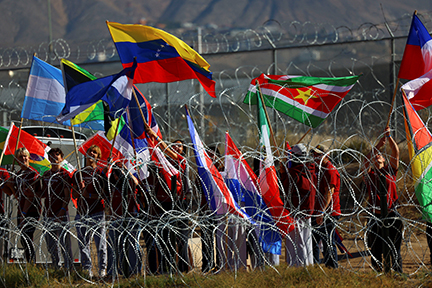
This time, he said, “all bets are off. They’ll have access to that information, so they could use it to track potential beneficiaries.”
On Nov. 7, U.S. District Judge J. Campbell Barker of the Eastern District of Texas struck down the KFT program – rolled out in June – arguing the Biden administration exceeded its authority. KFT allowed U.S. citizens’ spouses and stepchildren, who lacked legal immigration status but lived in the U.S. for 10 years or more, to apply for permanent residency without first having to leave the country.
Approximately 500,000 spouses of U.S. citizens and 50,000 noncitizen children under 21 with a parent married to a U.S. citizen were eligible for the program.
DACA allows approximately 535,000 young immigrants brought to the U.S. without authorization as children, to seek temporary protection from deportation. The program, which began in 2012 under the Obama administration, also allows them to work legally. Trump attempted to end DACA in 2017, but the Supreme Court upheld the program in 2020.
TPS is a program for people from countries experiencing such extreme internal disruption that their deportation would be considered unsafe, or even life-threatening. TPS recipients have legal authorization to work and remain in the U.S. while their countries of origin retain that designation. The program garnered widespread media attention this fall after false reports of immigrants eating pets in Springfield, Ohio, exploded on social media during the U.S. presidential campaign. However, there was underlying friction between some of the town’s native residents and thousands of Haitian recipients of TPS legally living and working there.
Those migrants with legal immigration status are not necessarily safe, said Appleby.
“It’s basically an executive authority that provided them that legal status. So the new executive, he can revoke it,” Appleby said.
Trump and Vice President-elect JD Vance both strongly suggested on the campaign trail that TPS, which currently protects 1 million people, will be curtailed in their administration. Trump himself pledged in October to revoke TPS for the Haitians living in Springfield and who are credited with fueling the Rust Belt city’s economic revitalization.
Erin Corcoran, executive director of the Kroc Institute for International Peace Studies and a faculty fellow at the Klau Institute for Civil and Human Rights at the University of Notre Dame, shared Appleby’s concerns regarding Trump’s mass deportation plans for an estimated 11 million people.
During his first term, President Trump deported 1.5 million people – a number President Joe Biden matched in 2024 – compared to 4.8 million during President Barack Obama’s two terms, according to data tracked by the Migration Policy Institute.
“If they want to do it really quickly – if they want to effectuate it immediately – the people that are going to be the most at risk,” Corcoran said, “are the people that actually have come in contact already with the authorities. The people who don’t have actual status – but who have come in contact with DHS in some way – I think are at risk of deportation.”
Which perhaps seems contradictory, Corcoran said.
“Those are in some ways the most sympathetic groups of people. From a moral perspective, from a humanitarian perspective, those are people who actually have done what they’re supposed to do,” she said. “They’ve come forward, they’ve given information; they’re in the system.”
And unlike most unauthorized immigrants, they’re easily located by authorities.
“These people who have registered – families – they have names; they have addresses,” Corcoran said.
Trump’s new “border czar” Tom Homan, who was named to the role Nov. 10 and will not require Senate confirmation, has repeatedly addressed the question of mass deportation’s effects on families. Homan was Trump’s acting director of Immigration and Customs Enforcement during the 2017-2018 “zero tolerance” era that witnessed children taken from their parents in the midst of illegal border crossings.
In response to whether mass deportation can be conducted without separating families, Homan told CBS’ “60 Minutes” in October, “Of course there is – families can be deported together.”
On Dec. 26, Homan told multiple media outlets that the incoming Trump administration is considering open-air family detention centers for holding and deporting families. He said parents facing deportation will have to decide whether their U.S.-born children will come with them, or remain in the U.S. with a relative. He offered the following justification: “You knew you were in the country illegally and chose to have a child. So you put your family in that position.”
Pedro Alemán Perfecto, a policy advocate at the Catholic Legal Immigration Network Inc., also known as CLINIC, acknowledged Homan’s pledge to come after migrants with greater force. But he kept a measured outlook, noting that migrant advocates have also been preparing.
“It’s not about panicking the community or individuals. It’s being cautious – but vigilant – about this,” he said. “That’s what our community and vulnerable immigrant communities are feeling right now: They’re looking at who can be leading us; who can be working with us. And it’s knowing what’s going to happen in the next four years for them.”
Advocacy tactics, said Alemán, will likely need to adapt.
“At CLINIC, we strive to put a lot of information out there in the community, to combat misinformation and disinformation,” he said. “For us, it’s doing our research; doing our advocacy; knowing who we can trust with different partners – and then reaching out to impacted individuals on the ground.”
The destination of mass deportees also remains an open question. They may not even end up in their countries of origin.
NBC News reported Dec. 5 the incoming Trump administration is assembling a list of potential countries to ship migrants to if their home nations refuse to accept them. The Bahamas stated it had “reviewed and firmly rejected” the Trump plan, while NBC’s sources said other countries under consideration include Turks and Caicos, Panama, and Grenada.
In an NBC “Meet the Press” interview broadcast Dec. 8, Trump echoed many of Homan’s comments, noting his deportation agenda will focus on those with criminal histories – while also vaguely referring to “other people outside of criminals.”
He also reinforced his pledge to end birthright citizenship, while saying he was open to working with Democrats to devise a plan concerning “the Dreamers,” or DACA recipients.
At the U.S. bishops’ general meeting in November, Bishop Mark J. Seitz of El Paso, Texas, the bishops’ migration committee chair, said the bishops are “waiting to see just exactly what takes shape.” But he promised they will “raise our voice loudly,” if Trump’s deportation rhetoric becomes a reality.
Reports indicate not only that the incoming Trump administration’s mass deportation policy will be ready to launch Day 1 – it will run headlong into the life of the church.
On Dec. 11, NBC News reported Trump’s incoming administration plans to rescind a long-standing “sensitive locations policy” previously prohibiting the arrest of unauthorized migrants – except under certain circumstances – at churches, schools, and hospitals.
Appleby said the U.S. bishops are facing a critical moment that will “test the resolve of the church.” While statements of solidarity are helpful, Appleby said plans for direct action – including direct support and legal assistance to immigrant families – are required.
“If Trump fully implements this,” Appleby predicted, “it’s going to impact the life of the church. You’re going to have ICE agents outside the Mass door. You certainly will see some immigrants seek sanctuary in their parishes. And it will put the bishops in a difficult position with the government.”
“We have a pope who is a strong defender of migrants,” Appleby said. “And hopefully, the U.S. church will reflect that in their response to this massive deportation plan.”
(Kimberley Heatherington writes for OSV News from Virginia.)
THINGS OLD AND NEW
By Ruth Powers
The new year is the traditional time for taking stock and making resolutions for positive change. In addition to the usual things like lose weight, get more exercise, and the like, some of us may have made a decision to try to focus on improving the spiritual aspect of our lives. In this era when so many people say that they are “spiritual but not religious,” we may begin to wonder exactly what “spirituality” is, and furthermore, is there a specifically Catholic spirituality.
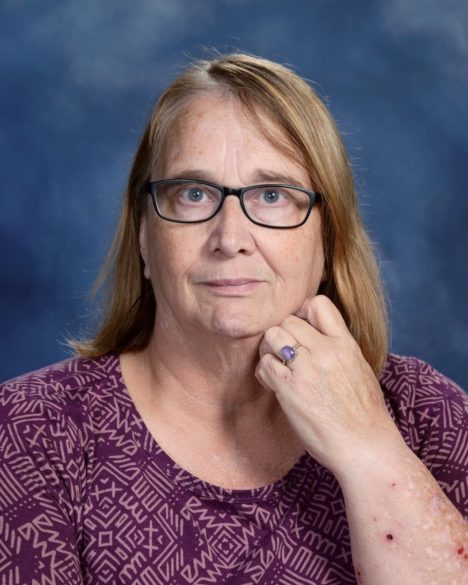
In its broadest definition spirituality is the combination of praying and living. It is the way in which our relationship with God plays out in our day to day lives and informs our life choices. Most people think of spirituality in terms of one’s private relationship with God, a view strongly influenced by Protestant ideas of spirituality. However, in Catholicism it also includes our acts of public group worship specifically the Mass and the Divine Office (Liturgy of Hours), both of which are meant to unite us in the worship of God.
Another thing to understand is that it isn’t correct to refer to spirituality as if it is a single approach to the Catholic relationship with God and prayer. Instead, it is more appropriate to speak of “spiritualities” – ways of relating to God that grew out of different communities at different periods of the church’s history. Some faded away or developed into other forms. Others have stood the test of time and continue to be important today. (More on this below.) They do all have one very important thing in common: Christ is the center and model of any true approach to spirituality.
Jesus is the focus of all true Christian Spirituality. Jesus Christ, God’s only begotten Son and second person of the Trinity, took on our humanity in order to redeem us from our fallen state caused by the disobedience of our first parents. As a result of this disobedience, we are born “good but wounded” (different from Protestant viewpoint that we are born depraved) and Jesus came to make it possible for us to be healed of this wound by God’s grace.
Throughout his ministry Jesus spoke about his mission being to accomplish the will of the Father. That was his sole focus. (John 5:19,30 and John 6:38) Since authentic Catholic spirituality also asks us to imitate Jesus, it centers on the process of surrendering one’s own will to the will of God, and daily seeking to know and accomplish God’s will rather than our own. In knowing and accomplishing God’s will, we find the ultimate source of purpose and life. (Matthew 7:21 and John 6:40) Any form of prayer or spiritual devotion that does not ultimately lead us to Christ, whether it be Marian devotion, devotion to one of the Saints, or whatever, is a false spirituality.
There are many approaches to spirituality accepted by the church. Different people may respond better to one approach or the other, or some combination of approaches. Below is an overview of just three examples of well-known spiritual schools within the broader range of Catholic spirituality.
Monastic/Ascetic Spirituality – This approach is most often associated with St. Benedict, but its roots actually go back into the early days of the church when the Desert Fathers removed themselves from the temptations of society in order to concentrate their whole lives on prayer, study of scripture and union with God. Some characteristics of monastic/ascetic spirituality include an emphasis on “getting away” from everyday life to spend time in quiet prayer and spiritual reading; contemplative prayer seeking union with God (strong in all Catholic spiritual traditions, “centering prayer” is a modern form of this); and disciplining the body through things like fasting and other forms of self-denial to focus on eliminating sinful impulses.
Incarnational Spirituality – This approach to spirituality is most often associated with St. Francis of Assisi and the great Franciscan scholars St. Bonaventure and Blessed John Duns Scotus, although aspects of it are part of other spiritual traditions as well. In Incarnational Spirituality the incarnation of Christ is not a “Plan B” which occurred in response to sin. Instead, the Incarnation was the plan for the beginning and represents the pinnacle of Creation, where God freely and out of supreme love takes on human nature: “the universe is for Christ and not Christ for the universe” and “He is the beginning, middle, and end of creation.” Love is the center of this spirituality. Duns Scotus and Bonaventure taught that the reason for the incarnation is love – Christ would still have come as the supreme manifestation of God’s love for the creation he freely brought about. Love is the center, not sin. Franciscans do not reject the theology of the atonement or the Cross. Rather, we seek to emphasize the aspect of the nature of God being love, but not to the point that we reject any theological teachings that are firmly rooted in the church, like the atonement. Our focus does not take away the role that the Cross played in redemption; rather, we focus on God’s love, rather than man’s sin. In addition, by seeing Christ as the center of all creation, Christ can be experienced in all of creation.
Spirituality of the Cross – This is the approach to spirituality that most Catholics probably know best. It says that the Cross is where we find the ultimate source of meaning and the explanation of God’s saving that “through suffering and death we come to new life.” The spirituality of the Cross centers on the reality of the redemptive value of suffering and the realization that moments of pain and death have been given meaning and transformed by the death of Christ into the means of our salvation. Out of this approach have come some of the greatest and best-known spiritual writers in the history of the church – Thomas Aquinas, Theresa of Avila, John of the Cross and Ignatius of Loyola.
(Ruth Powers is the program coordinator for The Basilica of St. Mary in Natchez.)